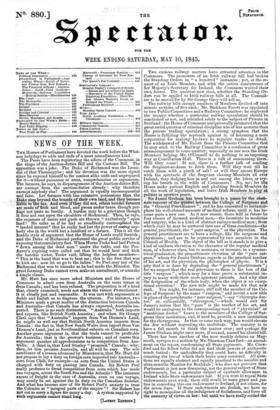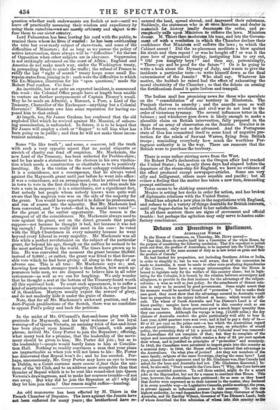Two curious railway matters have attracted attention in the Commons.
The promoters of an Irish railway bill had broken the Standing Orders in " a hundred" instances ; yet, at the re- quest of an Irish Member, and with the active concurrence of her Majesty's Secretary for Ireland, the Commons waived their own decree. The question now rises, whether the Standing Or- ders can be applied to Irish railway bills at all. The Commit- tee to be moved for by Sir George Grey will tell us. The railway bills occupy numbers of Members divided off into minute sections of five each : Mr. Bickham Escott was appointed to two Public Committees and a Railway Committee : he neglected the inquiry whether a particular railway speculation should be sanctioned or not, and attended solely to the subject of Prisons in Scotland : the House of Commons unequivocally intimated that the great social question of criminal discipline was of less moment than the private trading speculation ; a strong symptom that the House is fulfilling the reproach against it, of becoming a mere corporation for making by-laws to regulate trades in detail. The withdrawal of Mr. Escott from the Prisons Committee that he may stick to the Railway Committee is a confession of gross mismanagement in some quarter especially as one sees the Irish Members helping Mr. O'Connell to do nothing in an imposing way at Conciliation Hall. There is a talk of summoning them. Will they come? If not, there is a further talk of sending the Sergeant-at-Arms to fetch them. Will they wait till he- catch them with a pinch of -Salt ? or will they amuse Eurojie with the spectacle of the Sergeant chasing Members all over Ireland, they dodging him in and. out among the lakes, or try- ing his breath in the wilds of Connemara ? No, no ; let the House make patient English and plodding Scotch Members do all the work of legislation, and leave Irish Members to play at politics in sportive peace.
Sir James Graham has been brou„,,o•ht to a pause by the obsti- nate rancour of the quarrel between the College of Surgeons and the "General Practitioners " ; and he has consented to metamor- phose his well-abused measure of medical reform, until it has be- come quite a new one. As it now stands, there will in future be four classes of licensed medical men,-7-the licentiate in medicine and surgery, who is a kind of abstract embryo medical man ; from which state he may be nurtured into one of three conditions—the general practitioner, the "pure surgeon," or the physieien. ma general practitioners are to have a college; like the surgeons and_ physicians; and are to be represented by two members in the Council of Health. The object of the bill as it stands is to give al kind of uniform elevation to the character of the regular medical man of whatever class, but to maintain, or increase, in a symme- trical graduation, the proportionate elevation of the "pure sur- geon,"- whom Sir James Graham regards as the practical teacher of his art, and the physician; the philosopher of physic.' It is a pity that it is done by degrading the general practitioners " ; for we suspect that the real grievance to them is the loss of the title " surgeon " ; which may for a time prove a substantial in- jury to many with their more ignorant patients. And why alter the designation of the whole body, when the object is an excep- tional elevation? The new title might be made for that new rank. You might, for instance, still call the member of the Col- lege of Surgeons by the name "surgeon," and invent a new title in place of the periphrastic "pure surgeon,"—say " chirurgite doc- tor," or, colloquially, "chirurgeon,' —which would suit Sir James's notion that the " pure " is the teacher of his art, and would be analogous to the corresponding rank of "physician" ,or "medicinae doctor." Leave to the members of the College of Sur- geons their institution, and, if need be, provide a new institution for the chirurgeons. In that or some such way, you would elevate the few without degrading the multitude. The country is to have a full month to think the matter over ; and perhaps Sir James Graham might once more, if coaxed, amend his-abatedlill. There has been another of the now weekly debates on. May- nooth, apropos to a motion by Mr. Sharman Crawford—an amend- ment on the report, condemning all State payments. Mr. Craw- ford and his fellow teller did -not find their powers of arithmetic much tasked ; for undoubtedly they could have no difficulty in counting the two of which their brave army consisted. All ques- tions are equally abstract and 'equally practical to the amiable and ultra-sensible Member for Rochdale ; who does not perceive that Parliament is just now discussing, not the general subject of State endowments, but a particular subject of equitable allowance to. Ireland While State endowments last. If you were to repeal State endowments next week,' there still would be some grace and jus- tice in conceding this-one--endowment to Ireland, if not others, for the seven days. If State endowments are foolish, we have no right to monopolize all the indulgence of foolishness, and force all the austerity of virtue on her: but we have really settled the question whether such endowments are foolish or not—until we leave off practically assuming their wisdom and expediencyhy using them ourselveseikwe a,re meetly arbilirelly and *lust to Is- fuse them to our sister country. Lord Palmerston has been leaving his card with fie public! 'to remind them where he lives if *anted : he has been overhatilint the trite but ever-ready subject of slave-trade, and some of the difficulties of Ministers ; for as long as we pursue the policy of active intervention, there always will be "difficulties" for the use of Opposition when other subjects are in abeyance. Suppression is not strikingly advanced on the coast of Afrioa ; England and America do not make much way, under the Washington treaty, in.persuading Brazil to quash the traffic; the refusal of France to ratify die last "right of search" treaty keeps some small Eu- ropean states from joining in it : such were the difficulties to which the Ex-Minister, illustrious for his "open questions," made Sir Robert Peel confess. Cui bono ?
An inevitable, but not quite an expected incident, is announced this week : the Colonial Office people have at length been unable to venture on further postponement of Captain Fitzroy's recall. May he be made an Admiral, a Baronet, a Peer, a Lord of the Treasury, Chancellor of the Exchequer—anything but a Colonial Governor! Ministers owe him some reparation for having ex- limed him to that ordeal.
At length, too, Sir James Graham has confessed that the old exploded libel which he revived against Mr. Mazzini, of suborn- ing assassination, is unfounded. In future, it is to be hoped that pir James will employ a clerk or "flapper" to tell him what has been going on in public ; and then he will not make these incon- Venient mistakes.



























 Previous page
Previous page